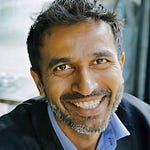The summer of 2022 may go down in history as the moment the world woke up to the global water crisis. So I’m thrilled to introduce today’s conversation with Nigel Crawhall, who heads up the local and indigenous knowledge division at UNESCO.
What I wanted to learn about is a recent upsurge in demand for indigenous perspectives and solutions in the water space. Nigel recently attended an important UN meeting on water in Tajikistan where he facilitated a first ever forum for indigenous people to have a voice in this political process to reshape how we think about and and act on water in an era of crisis.
Nigel explains the nuts and bolts of how to bring indigenous perspectives into fora previously dominated by Western knowledge. We also talk about the new geopolitics of water - why high altitude actors, for example, are now influential players, the role of decolonization in closed-door meetings and everything you need to know about the latest IPBES assessments on wild species and values of nature.
Nigel has a fantastic ability to convey vast amounts of knowledge through great storytelling. So if you’ve found this topic challenging in the past, our conversation will definitely open new doors.
What we talked about:
2.34 The paradigm shift on indigenous knowledge dates back to the 2007 UN Declaration on rights of indigenous peoples. Over time, this converged with global challenges around sustainability - the idea that we need everyone at the table, that exclusion is part of the problem so participation is part of the solution
4.13 The new normal is bringing in multiple streams of evidence including indigenous knowledge into scientufuc assessments and decision making.
6.38 For too long we have been focused on western models & urban living & missed out on the majority of human understanding & knowledge about the world.
7.38 Zoom into the politics of water: why did the UN wait nearly half a century to hold a big international conference in water next March in NY?
8.41 Why is it difficult for indigenous people to be involved in water policy ?
9.28 What is the UN water action decade ? UN Decades are major areas of international policy concern -they are a global agenda setting tool. Alongside water currently there are Decades on Ocean Science & Ecosystems Restoration
10.07 one distinctive feature of the Water Action Decade has been the scant public participation - mostly a technical process. Until the Dushanbe conference opened the door.
13.00 From the Arctic to the Kalahari to the Mekong, traditional knowledge holders bring a wealth of insight on water governance. Hearing their stories helps build a bridge between the rights based and the knowledge based approach.
17.05 Why is water so political?
One reason is that the state is the main arbiter of the management of water, yet thé living experience of water happens at the ground level.
18.50 high altitude countries with glacial systems have emerged as influential actors in mulltilateral negotiations on water.
20.21 Why the Dushanbe declaration is an extraordinary document, a mini Paris agreement
22.17 what to know about the latest IPBES assessments approved in Bonn?
The values assessment gets to the heart of « what matters ». While many want to quantify the value of nature, others say if you put a price on it it means you intend to extract it & turn it into cash value. What the assessment does is look at what is the value of nature from different perspectives.
26.05 Should we talk about decolonization as a context for understanding north/south & east/west stressors in multilateral negotiations? The developing world sees itself as having collective interest about global justice & equity.










